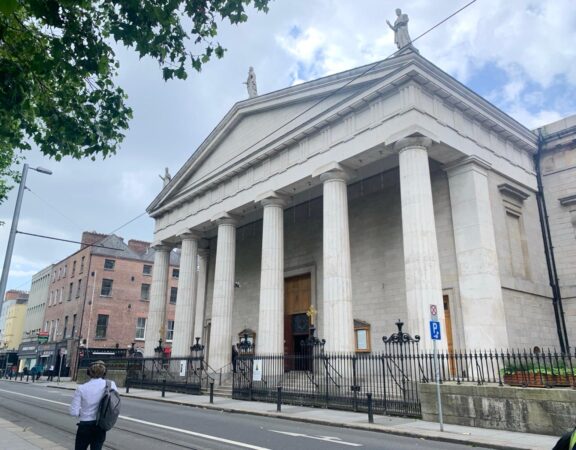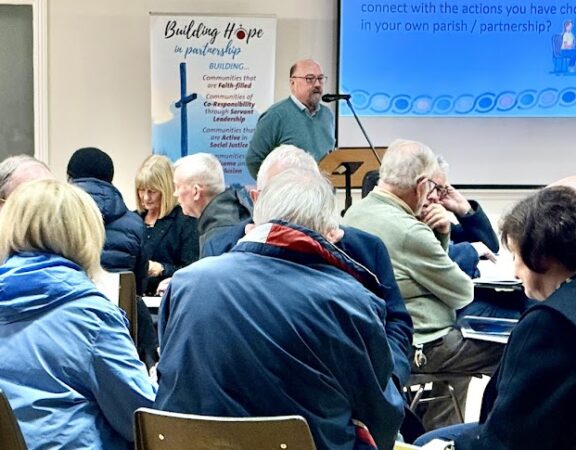COMPANION TO THE COMPENDIUM OF THE
SOCIAL DOCTRINE OF THE CHURCH
SOCIAL DOCTRINE OF THE CHURCH
Speaking notes of
Most Rev. Diarmuid Martin
Archbishop of Dublin, Primate of Ireland
—————-
Henrietta Street, Dublin, 26th September 2007
Most Rev. Diarmuid Martin
Archbishop of Dublin, Primate of Ireland
—————-
Henrietta Street, Dublin, 26th September 2007
I remember as a young man the series of Catholic Social Study Congresses which were held annually in Dublin in the 1960’s, usually in the National Boxing Stadium, dedicated to different questions about Irish society and how Catholic Social Doctrine had been applied to them in Ireland and in different parts of the world.
They were a little triumphalist, with bishops dressed in full purple entering in procession, to what became a premier social event in Dublin’s Catholic calendar. Politicians, business people, trade unionists and Catholic socialites were all in their best suits, religious were in full habits – paradoxically concerned that someone speaking too long at Archbishop Mc Quaid’s conference might prevent them being back in their convents before the same Archbishops Mc Quaid’s curfew time for nuns.
It was a social event, an event very much of its time, culturally and ecclesiastically, but it was an event which made people think. I can still remember a remarkable talk by Bishop Peter Birch on poverty, which left an indelible mark on my own reflection and another by Bishop Derek Worlock on what we would today call collaborative ministry. Fascinating talks, and not just for their time.
Curiously interest in Catholic Social teaching waned with the coming of Vatican II. Gone were the days of the Social Study Conferences. Organizations like the Christus Rex Society, linked with Maynooth College, went into hibernation and have yet to re-emerge. Many were unhappy with the term doctrine, preferring social teaching or social reflection or social thought. There was the feeling in many places that the social teaching of the Church should be a form of social ethic which could be shared by people of various viewpoints, religious or not. There were clashes with different visions of social teaching. The cold war inevitably led to a polarization of ideologies in social and economic reflection of all types. Certain trends of Liberation Theology had assumed a methodology which was flawed by elements of Marxist analysis. In other cases, a generalised negative reaction to anything doctrinaire led to a greater individualism and relativism in ethical reflection.
Curiously interest in Catholic Social teaching waned with the coming of Vatican II. Gone were the days of the Social Study Conferences. Organizations like the Christus Rex Society, linked with Maynooth College, went into hibernation and have yet to re-emerge. Many were unhappy with the term doctrine, preferring social teaching or social reflection or social thought. There was the feeling in many places that the social teaching of the Church should be a form of social ethic which could be shared by people of various viewpoints, religious or not. There were clashes with different visions of social teaching. The cold war inevitably led to a polarization of ideologies in social and economic reflection of all types. Certain trends of Liberation Theology had assumed a methodology which was flawed by elements of Marxist analysis. In other cases, a generalised negative reaction to anything doctrinaire led to a greater individualism and relativism in ethical reflection.
Today in Ireland when we talk about the role and the involvement of the laity in Church life, we tend to speak about participation and leadership in local pastoral structures. I believe that we need to get back to grassroots in the formation of lay persons – women and men – for the “secular nature of their Christian discipleship”, their duty “to proclaim the Gospel with an exemplary witness of life rooted in Christ and lived in temporal realities”.
The Irish Church needs more active, articulate lay people who understand and assume their responsibilities as Christian believers in various aspects of society. Irish society and Irish democracy would benefit from a new generation of lay people, prepared and capable of informing public opinion, on the contribution that can be derived from the message of Jesus to establishing values to inspire pluralistic Irish political and social life.
Many were surprised by a comment of Pope Benedict XVI in his Encyclical Deus Caritas Est, which affirms “that the just ordering of society and the State is a primary responsibility of politics” and adds later that “the Church cannot and must not take upon herself the political battle to bring about the most just society possible”. Some have seen this as a recipe for the retreat of the Church from commenting on the public arena. I look on this as a remarkably strong emphasis on the importance of politics and on the real purpose of politics. Politics is an essential dimension of the construction of society. We need, right around the world, a new renewal of politics. Around the world we need a new generation of politicians inspired by ideals, but also capable of taking the risks involved in transmitting those ideals into the “possible”, though the optimum use of resources and talents to foster the good of all. Christian politicians cannot be absent from this process of renewal.
Many were surprised by a comment of Pope Benedict XVI in his Encyclical Deus Caritas Est, which affirms “that the just ordering of society and the State is a primary responsibility of politics” and adds later that “the Church cannot and must not take upon herself the political battle to bring about the most just society possible”. Some have seen this as a recipe for the retreat of the Church from commenting on the public arena. I look on this as a remarkably strong emphasis on the importance of politics and on the real purpose of politics. Politics is an essential dimension of the construction of society. We need, right around the world, a new renewal of politics. Around the world we need a new generation of politicians inspired by ideals, but also capable of taking the risks involved in transmitting those ideals into the “possible”, though the optimum use of resources and talents to foster the good of all. Christian politicians cannot be absent from this process of renewal.
Catholic Social Doctrine is effectively about democracy. That may seem strange to some, since for many years Catholic Social teaching seemed to be hesitant to explicitly affirm democracy. I say that Catholic social teaching is about democracy in a particular sense: it is about democracy as participation and discernment.
A book on Catholic Social teaching is not a recipe book, or a catechism old style with a list of ready made answers to the social and political questions of the day. It presents a unified corpus of principles and criteria which draw their origin from the gospels and which are applied to the realities of the times in order to form Christians to make their own personal responsible judgements on the best manner to stimulate the ideals proposed by the Gospel in contemporary culture. Catholic Social Doctrine does not take away the risk of politics, but it aims to provide an in injection of purpose, idealism, integrity and truthfulness into the way politics is carried out.
The Social Doctrine of the Church is about democracy as participation. It is about enhancing the level of participation and discernment that is present in community. It leads to create critical ownership of the political process and active participation.
The Social Doctrine of the Church is about democracy as participation. It is about enhancing the level of participation and discernment that is present in community. It leads to create critical ownership of the political process and active participation.
I believe that many of the problems in Irish society of the future will require a much greater level of community articulation than heretofore, so that we can combat the influence on politics of ideology, superficial news reporting, vested financial interests or sheer inertia. I believe that we need broad community debate — real debate on such issues as the future of education and real participation in the fight against crime and violence. We had another particularly brutal example of gun violence on our streets yesterday. We all pray that Garda Paul Sherlock will make a full recovery.
If it is permissible for someone often categorised as a diplomat for once to speak out of place, I would say that I was very much encouraged by the community-based approach to fighting crime which I heard in Gordon Brown’s speech two days ago to the British Labour party. I believe he is right. The fight against weapons and knives in our society will only be overcome when we arrive at mobilising the communities in which we live. I still believe there is much more to do on this front.
Having just supported a politician, I now have to stress that the social doctrine of the Church is not a political manifesto and cannot be simply appropriated as the agenda of any political party. Neither is its aim to foster unnecessary divisions or factions within the Church. The Church cannot impose anything as binding, except that which it can draw out of the bible and authentic tradition. It recognises that Christians may work in different ways in order to reach the same goal. At the same time the term “doctrine” draws attention to the fact that the Christian cannot simply decide that anything goes in terms of social conscience and that certain underlying principles of the social doctrine, especially those at the kernel of the Church’s teaching, have binding character in their own right.
Having just supported a politician, I now have to stress that the social doctrine of the Church is not a political manifesto and cannot be simply appropriated as the agenda of any political party. Neither is its aim to foster unnecessary divisions or factions within the Church. The Church cannot impose anything as binding, except that which it can draw out of the bible and authentic tradition. It recognises that Christians may work in different ways in order to reach the same goal. At the same time the term “doctrine” draws attention to the fact that the Christian cannot simply decide that anything goes in terms of social conscience and that certain underlying principles of the social doctrine, especially those at the kernel of the Church’s teaching, have binding character in their own right.
The Compendium is a theological reading of the signs of the times. It examines the evolution of the revelation of God’s love in the history of salvation, especially the revelation of God’s Trinitarian love.
The Social Teaching of the Church is an admirable instrument for community formation. The availability this Companion will make the wealth of the Compendium accessible to a wide range of groups and individuals. As I said at the launch of the Compendium, the Compendium is too important a document to be usurped by Episcopal commissions or professional Church bureaucrats. There is a sense in which the real “translation” of any social encyclical or any document of the social teaching of the Church is written not by professional interpreters, but by the action of Christian lay people in the world – who try, day by day, to apply these principles in their life and commitment. The new Companion will certainly be further useful instrument for them in achieving this task and I congratulate Father Padraig Corkery on his work.







